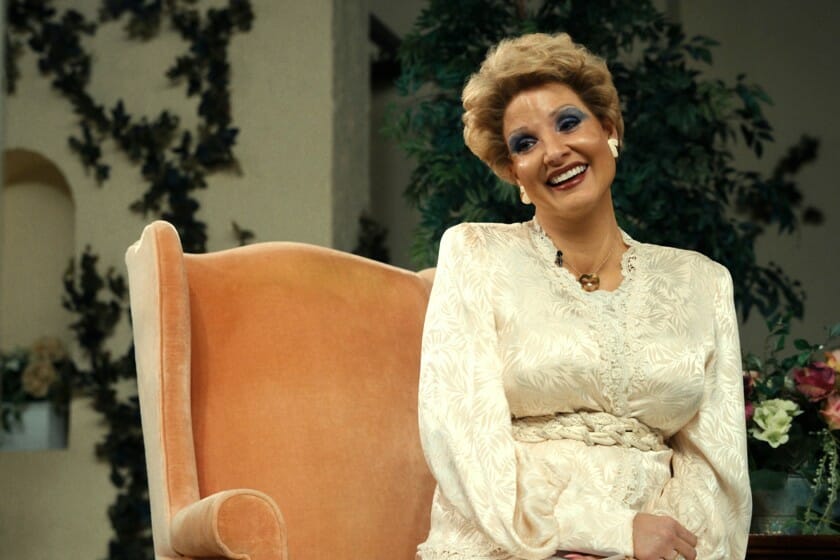The story of Tammy Faye and Jim Bakker is a marriage of two different kinds of Christians. Jim Bakker, an infamous televangelist, saw the lucrative potential of Christianity and never looked back. He was eventually convicted of accounting fraud and sent into the reformative U.S. prison system, after which he emerged a new man (just kidding; he’s lying on TV again.) Tammy Faye was a whole different story. From a young age, she had a natural sense of empathy but was only taught to filter that feeling through the claims of Christianity. The Eyes of Tammy Faye starts with that childhood conflation and charts her life from there.
The film takes a narrative spin on the documentary of the same name, complete with big-name actors and the teal/orange color grade of every other Hollywood movie since 2005. Tammy (Jessica Chastain) and Jim (Andrew Garfield) meet during college, do the ceremony that lets them have sex, and embark on a cross-country evangelism tour. That leads them to a partnership with Pat Robertson, their own show on the Christian Broadcasting Network, and then the confidence to leave CBN and start their own TV empire.
READ ALSO: NAI Horizon’s Church Realty Solutions practice links real estate to ministry
This all happens very, very quickly. The Eyes of Tammy Faye chronicles its subject across decades, covering her as comprehensively as a skipped rock covers a lake. It touches down on key events like any traditional biopic, but it moves between these events expeditiously—the structure barely fits the movie’s two hours. Immediately after Tammy and Jim decide to leave CBN, the film cuts to the opening of their new program, already developed and—oh, wait, that’s not the opening, it’s cutting to five years into their new program. Most of the film moves at this hurried pace. Tammy Faye, eyes and all, gets lost in the mix.
That’s not to say the film isn’t informative. You’ll learn a lot about Tammy: her unstoppable drive, her boisterous rejection of Jim’s bigotry, and most importantly, the size of her heart. It’s just that you could also learn these things from an assemblage of news clippings. The Eyes of Tammy Faye is a shockingly surface-level biopic, often hinting at further depth in its subject but rarely diving in.
A telling example of this lost potential is the portrayal of Tammy’s interview with Steven Pieters—a gay, Christian pastor with AIDS—on her husband’s conservative network. On a surface level, we know it was a radical move. The details, however, have been fudged over. Records show that Jim was aware of the interview yet let it happen anyway, suggesting a successful rebellion on Tammy’s part. We can surmise from her well-publicized traits that this was possible. But the movie, in its rush to get through the bullet points, depicts the interview as a happy accident: Jim just happened to not be looking when the interview aired. Tammy comes off as more lucky than radical, which is counter to what history (and even the film, in its best scenes) tells us. Tammy’s dialogue with Pieters is still moving—it was ripped line-for-line from the real thing—but the sense that we’re missing a piece of the puzzle is pervasive.
The same goes for Tammy’s relationship with wealth. In broad strokes, the film hints that Tammy suspected her money’s immoral origins. That doesn’t stop her from embracing luxury with open arms. Surely there was some level of mental dissonance there—the kind that The Sopranos explored in-depth through the character of Carmela—but The Eyes of Tammy Faye smooths it over to get to the next thing. There’s a moment when Tammy is mourning her unanswered prayers, the shot framing her like yet another fixture of her opulent home—an alabaster prison that prayer can’t penetrate. It’s evocative, but then it’s back to business as usual.
Much praise has been heaped on Chastain for her performance, and rightly so. She imbues Tammy with enough layers to save the movie. When the tone borders on farce, Chastain stays rooted in the character’s interior, ensuring that she demands sympathy and respect. The world saw Tammy Faye as a caricature; Chastain works hard to peel that image back. A positive side effect of the movie’s pacing is that it never lets up on Tammy: mocked by her peers and the press, she suffers blow after blow after blow, no room in the runtime for reprieve. It makes her persistence all the more profound. Chastain’s performance is one of dogged survival, and it restores in Tammy the dignity she saw in everyone else.
The film does slow down after its climax, relaxing into its better natures. There’s enough time to let Tammy’s virtues shimmer in the spotlight, uncrowded by an archive of well-known incidents. The lifeblood that sustained her across two hours of suffering comes into full view: boundless hope and unconditional love. The mere fact that she’s alive suggests a concrete power in those intangibles. In the end, at least, The Eyes of Tammy Faye finds God.
★★½ (2.5/5)




